Education
-
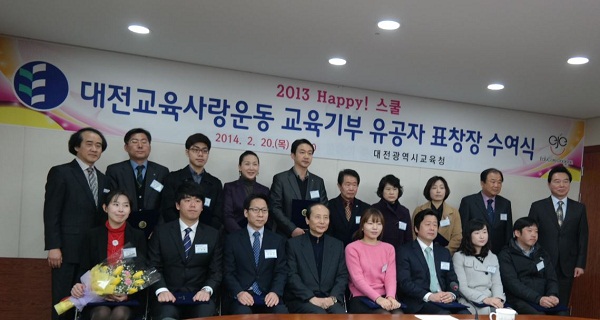 A student club for education donation at KAIST received an award from the City of Daejeon Education Superintendent
One of the student clubs at KAIST, the Midam Scholarship Fund, was awarded by the education superintendent of Daejeon City in recognition of its contributions to the education benefits of underprivileged students in the region.The Midam Scholarship Fund was established in 2009, and since then, it has helped many teenage students who are suffering financial hardships through knowledge donation. The Fund organized private classes and mentoring programs for the students as well as collaborating with other education donation clubs at seven different universities in Korea.The award ceremony was held on February 20th at the City Hall in Daejeon.
2014.02.21 View 7617
A student club for education donation at KAIST received an award from the City of Daejeon Education Superintendent
One of the student clubs at KAIST, the Midam Scholarship Fund, was awarded by the education superintendent of Daejeon City in recognition of its contributions to the education benefits of underprivileged students in the region.The Midam Scholarship Fund was established in 2009, and since then, it has helped many teenage students who are suffering financial hardships through knowledge donation. The Fund organized private classes and mentoring programs for the students as well as collaborating with other education donation clubs at seven different universities in Korea.The award ceremony was held on February 20th at the City Hall in Daejeon.
2014.02.21 View 7617 -
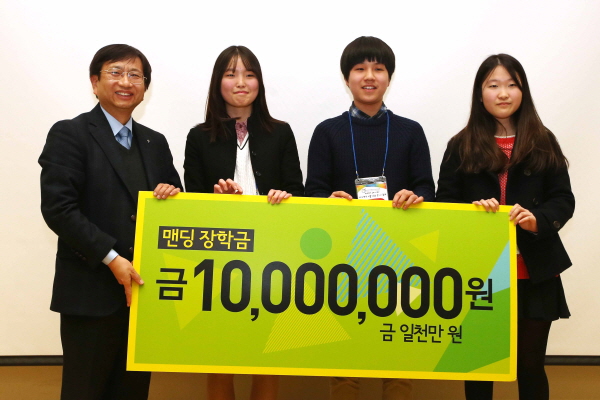 Venture Startup by Middle School Students Makes Donation to KAIST
Korean middle school students who
participated in a venture program made donations to KAIST. “Mending”, a startup founded by Korean
middle school students, donated 10 million won and the education supplier “Edubox”
contributed 100 million won to the IP Education Center for Young Venture Candidates
at KAIST. The donations were made at the IP
Education Center’s 3rd graduation ceremony on February 14th
at KAIST. Mending was started by three students in
the IP Education Center in 2013. This startup
features volunteering through talent sharing and other educational endeavors. It
received voluntary donations from supporters of the programs. Hee-Yon Yon, the co-president of
Mending, said, “We have developed a new concept of business and showed profit
can be made through donations and sharing”. Edubox responded to the visions of
Mending and added to the donation for additional development of the IP
Education Center. The KAIST IP Education Center for
Young Venture Candidates was founded with the support of KIPO (Korean
Intellectual Property Office) and KIPA (Korea Invention Promotion Association)
in 2009. The curriculum consists of Intellectual Property, Entrepreneurship, Future
Technology and Humanities. Eighty students are selected for the program every
year and 200 students have successfully completed the program.
2014.02.18 View 7530
Venture Startup by Middle School Students Makes Donation to KAIST
Korean middle school students who
participated in a venture program made donations to KAIST. “Mending”, a startup founded by Korean
middle school students, donated 10 million won and the education supplier “Edubox”
contributed 100 million won to the IP Education Center for Young Venture Candidates
at KAIST. The donations were made at the IP
Education Center’s 3rd graduation ceremony on February 14th
at KAIST. Mending was started by three students in
the IP Education Center in 2013. This startup
features volunteering through talent sharing and other educational endeavors. It
received voluntary donations from supporters of the programs. Hee-Yon Yon, the co-president of
Mending, said, “We have developed a new concept of business and showed profit
can be made through donations and sharing”. Edubox responded to the visions of
Mending and added to the donation for additional development of the IP
Education Center. The KAIST IP Education Center for
Young Venture Candidates was founded with the support of KIPO (Korean
Intellectual Property Office) and KIPA (Korea Invention Promotion Association)
in 2009. The curriculum consists of Intellectual Property, Entrepreneurship, Future
Technology and Humanities. Eighty students are selected for the program every
year and 200 students have successfully completed the program.
2014.02.18 View 7530 -
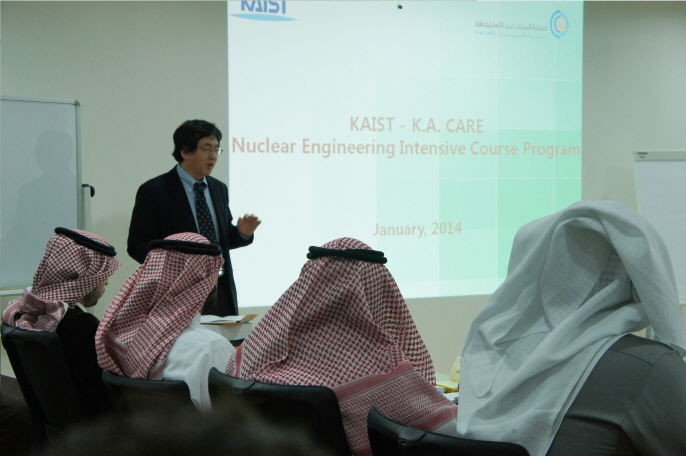 KAIST-Saudi Nuclear Workforce Training
Nuclear Engineering Intensive Course Program Held in Saudi Arabia from January 5th to 23rd
KUSTAR (The Khalifa University of Science and Technology Studies)-KAIST Institute of Education began its Nuclear Engineering Intensive Course Program on 5th January with researchers from K.A.CARE (King Abdullah City for Atomic and Renewable Energy) of Riyadh, Saudi Arabia.
This program, which was lasted until 23rd January, provided education to students on the basic technologies in the field of nuclear power.
The course involves a wide range of lectures, such as basic nuclear physics, applications using radiation, nuclear reactor design and safety, as well as nuclear power engineering.
In order to utilize the nuclear power and renewable energy, K.A.CARE was established in April 2010. The institution is also involved in the construction of nuclear infrastructure, including the site investigations, the establishment of regulatory bodies and state-owned nuclear companies, along with the newly launched workforce-training program.
The Director of the KUSTAR-KAIST Education Research Institute, Professor Soong-Heung Jang said, “This program is the beginning of long-term cooperation with Saudi Arabia. Our experience can be the basis for the construction of an extensive training program that involves many areas of nuclear engineering field.”
KAIST has been working in close cooperation with various institutions around the world, which also includes the establishment of KUSTAR-KAIST Institute of Education and Research in July 2010. KAIST is also actively cooperating with UAE Khalifa University in Middle East, sharing faculty, holding joint research programs and exchanging students.
2014.02.03 View 10949
KAIST-Saudi Nuclear Workforce Training
Nuclear Engineering Intensive Course Program Held in Saudi Arabia from January 5th to 23rd
KUSTAR (The Khalifa University of Science and Technology Studies)-KAIST Institute of Education began its Nuclear Engineering Intensive Course Program on 5th January with researchers from K.A.CARE (King Abdullah City for Atomic and Renewable Energy) of Riyadh, Saudi Arabia.
This program, which was lasted until 23rd January, provided education to students on the basic technologies in the field of nuclear power.
The course involves a wide range of lectures, such as basic nuclear physics, applications using radiation, nuclear reactor design and safety, as well as nuclear power engineering.
In order to utilize the nuclear power and renewable energy, K.A.CARE was established in April 2010. The institution is also involved in the construction of nuclear infrastructure, including the site investigations, the establishment of regulatory bodies and state-owned nuclear companies, along with the newly launched workforce-training program.
The Director of the KUSTAR-KAIST Education Research Institute, Professor Soong-Heung Jang said, “This program is the beginning of long-term cooperation with Saudi Arabia. Our experience can be the basis for the construction of an extensive training program that involves many areas of nuclear engineering field.”
KAIST has been working in close cooperation with various institutions around the world, which also includes the establishment of KUSTAR-KAIST Institute of Education and Research in July 2010. KAIST is also actively cooperating with UAE Khalifa University in Middle East, sharing faculty, holding joint research programs and exchanging students.
2014.02.03 View 10949 -
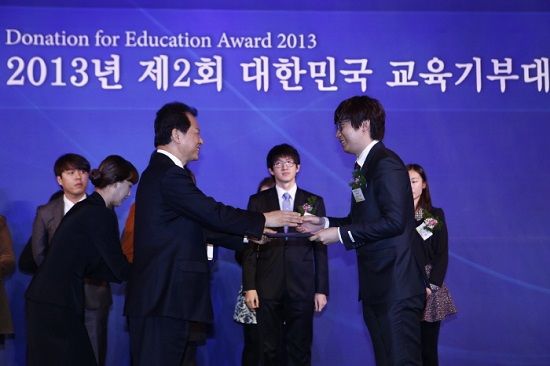 An Education Donation Club at KAIST Received the Education Minister's Award in 2013
Chalk, one of the student clubs at KAIST, shares knowledge by providing free online classes to teenage students in Korea via Internet.
Chalk, a KAIST student club which donates their educational knowledge, received an award from the Education Minister of the Republic of Korea at the 2nd Donation for Education Award held on December 16th, 2013 at the Plaza Hotel in Seoul.
The Donation for Eduation Award aims to find and reward corporations, organizations, and individuals, which have actively contributed to growing the dreams and talents of students, as well as revitalizing the culture of donation for education. It has been awarded by the Ministry of Education since 2012 to promote the awareness and participation of students for education.
Chalk provides free online video lectures on www.playchalk.com and runs a mentoring-based education program. The club has been recognized for offering online courses, math and science classes in particular, to teenage students who are from socially and economically less privileged backgrounds.
Chalk was founded by five KAIST students in 2011. Their ultimate goal is to create a society where students can fully enjoy the benefits of education, regardless of their economic conditions. About 60 undergraduate students currently participate in the club, with more than 5,000 students attending over 160 lectures without any cost.
2014.01.07 View 9820
An Education Donation Club at KAIST Received the Education Minister's Award in 2013
Chalk, one of the student clubs at KAIST, shares knowledge by providing free online classes to teenage students in Korea via Internet.
Chalk, a KAIST student club which donates their educational knowledge, received an award from the Education Minister of the Republic of Korea at the 2nd Donation for Education Award held on December 16th, 2013 at the Plaza Hotel in Seoul.
The Donation for Eduation Award aims to find and reward corporations, organizations, and individuals, which have actively contributed to growing the dreams and talents of students, as well as revitalizing the culture of donation for education. It has been awarded by the Ministry of Education since 2012 to promote the awareness and participation of students for education.
Chalk provides free online video lectures on www.playchalk.com and runs a mentoring-based education program. The club has been recognized for offering online courses, math and science classes in particular, to teenage students who are from socially and economically less privileged backgrounds.
Chalk was founded by five KAIST students in 2011. Their ultimate goal is to create a society where students can fully enjoy the benefits of education, regardless of their economic conditions. About 60 undergraduate students currently participate in the club, with more than 5,000 students attending over 160 lectures without any cost.
2014.01.07 View 9820 -
 KAIST Placed 3rd in the World's Best 100 Emerging Universities
The Times Higher Education (THE) published its world university rankings on June 20, 2013. It is a list of the best 100 universities whose histories are 50 years old or younger. KAIST was ranked 3rd in the list, two places up from the 5th last year. Forbes and Reuters carried a story on the top ten emerging universities out of the listed 100 institutions, highlighting strong showings in the Asian region. For the articles, please see the attached file (Forbes) or click the link (Reuters) below:
http://www.reuters.com/article/2013/06/19/education-university-rankings-idUSL2N0EU1HZ20130619
2013.06.22 View 7687
KAIST Placed 3rd in the World's Best 100 Emerging Universities
The Times Higher Education (THE) published its world university rankings on June 20, 2013. It is a list of the best 100 universities whose histories are 50 years old or younger. KAIST was ranked 3rd in the list, two places up from the 5th last year. Forbes and Reuters carried a story on the top ten emerging universities out of the listed 100 institutions, highlighting strong showings in the Asian region. For the articles, please see the attached file (Forbes) or click the link (Reuters) below:
http://www.reuters.com/article/2013/06/19/education-university-rankings-idUSL2N0EU1HZ20130619
2013.06.22 View 7687 -
 Synthesis of a New Organic Supermolecule Succeeded
From left to right: Prof.Stoddart, Prof.Goddard and Prof.Jang Wook Choi
KAIST EEWS graduate school’s research team led by Prof. Stoddart, Prof. Goddard and Prof. Jang Wook Choi has succeeded the synthesis of a new organic supermolecule that is stable in a radical condition under room temperature.
Prof. Stoddart, who mainly led this research, is the world’s great scholar on orgaic molecular structure especially on catenane with an interconnection of several ring structures. Catenane is originated from Latin “catenane” referring to “chain”. The brief structure of the synthesized catenane is as following:
Usually radicals are known to be unstable since they are electronically neutral and have very high reactivity. However, the radicals from this research showed air- and water- stability. It also showed a reversible change in oxidation number from o to +8 through chemical/electrochemical oxidation-reduction reaction. The phenomenon where paramagnetic and diamagnetic characteristics change according to the oxidation number has also been observed.
Thus, the research like this - on the molecules showing various characteristics with stable radical - is expected to give a new direction to the next-generation electromemory system, semiconductor and energy storage system research.
Meanwhile, this research, led by Prof.Stoddart team with Prof.Goddard and Prof. Jang Wook Choi’s team, is conducted under the support of Science and Technology’s World Class University project by Ministry of Education and published in ‘Science’ on 25th of Jan.
2013.02.24 View 11310
Synthesis of a New Organic Supermolecule Succeeded
From left to right: Prof.Stoddart, Prof.Goddard and Prof.Jang Wook Choi
KAIST EEWS graduate school’s research team led by Prof. Stoddart, Prof. Goddard and Prof. Jang Wook Choi has succeeded the synthesis of a new organic supermolecule that is stable in a radical condition under room temperature.
Prof. Stoddart, who mainly led this research, is the world’s great scholar on orgaic molecular structure especially on catenane with an interconnection of several ring structures. Catenane is originated from Latin “catenane” referring to “chain”. The brief structure of the synthesized catenane is as following:
Usually radicals are known to be unstable since they are electronically neutral and have very high reactivity. However, the radicals from this research showed air- and water- stability. It also showed a reversible change in oxidation number from o to +8 through chemical/electrochemical oxidation-reduction reaction. The phenomenon where paramagnetic and diamagnetic characteristics change according to the oxidation number has also been observed.
Thus, the research like this - on the molecules showing various characteristics with stable radical - is expected to give a new direction to the next-generation electromemory system, semiconductor and energy storage system research.
Meanwhile, this research, led by Prof.Stoddart team with Prof.Goddard and Prof. Jang Wook Choi’s team, is conducted under the support of Science and Technology’s World Class University project by Ministry of Education and published in ‘Science’ on 25th of Jan.
2013.02.24 View 11310 -
 Professor Hwang Kyu Young and Professor Yang Dong Yeol Receives Engineer of Korea Award
Emeritus Professor Hwang Kyu Young (Department of Computer Sciences) and Professor Yang Dong Yeol (Department of Mechanical Engineering) were named as the 2012 Engineer of Korea by the Ministry of Education, Science, and Technology and Korea Science Foundation.
The Engineer of Korea Award is awarded biannually to scientists and engineers that have contributed to the development of Korea’s science and technology and national economy.
Professor Hwang’s work with DBMS and close coupling architecture of information search and overall new theories and application technology development in the field of database system has aided the opening and expansion of IT software industry development and the advent of internet information culture era.
Professor Yang is a word renowned scholar in the field of net shape manufacturing and is considered to have opened a new page in the field of nano-molding technique.
In addition, Professor Eum Sang Il (Department of Mathematical Science) has been selected as the 2012 Young Scientist Award.
2013.01.22 View 11684
Professor Hwang Kyu Young and Professor Yang Dong Yeol Receives Engineer of Korea Award
Emeritus Professor Hwang Kyu Young (Department of Computer Sciences) and Professor Yang Dong Yeol (Department of Mechanical Engineering) were named as the 2012 Engineer of Korea by the Ministry of Education, Science, and Technology and Korea Science Foundation.
The Engineer of Korea Award is awarded biannually to scientists and engineers that have contributed to the development of Korea’s science and technology and national economy.
Professor Hwang’s work with DBMS and close coupling architecture of information search and overall new theories and application technology development in the field of database system has aided the opening and expansion of IT software industry development and the advent of internet information culture era.
Professor Yang is a word renowned scholar in the field of net shape manufacturing and is considered to have opened a new page in the field of nano-molding technique.
In addition, Professor Eum Sang Il (Department of Mathematical Science) has been selected as the 2012 Young Scientist Award.
2013.01.22 View 11684 -
 Op-Ed by Prof. David Helfman: Global Science and Education in the 21st Century
Professor David Helfman from the Department of Biological Sciences and Graduate School of Nanoscience and Technology(https://sites.google.com/site/cellsignalinglaboratory/home) recently wrote an Op-Ed in the January 2013 issue of Journal of Happy Scientists and Engineers that ispublished by the Ministry of Science, Education and Technology, the Republic of Korea. In the article entitled “Global Science and Education in the 21st Century,” Professor Helfman addressed three important issues in science and education, which will have a great impact for the development of world-leading universities in Korea. For the article, please see the attachment.
2013.01.22 View 12287
Op-Ed by Prof. David Helfman: Global Science and Education in the 21st Century
Professor David Helfman from the Department of Biological Sciences and Graduate School of Nanoscience and Technology(https://sites.google.com/site/cellsignalinglaboratory/home) recently wrote an Op-Ed in the January 2013 issue of Journal of Happy Scientists and Engineers that ispublished by the Ministry of Science, Education and Technology, the Republic of Korea. In the article entitled “Global Science and Education in the 21st Century,” Professor Helfman addressed three important issues in science and education, which will have a great impact for the development of world-leading universities in Korea. For the article, please see the attachment.
2013.01.22 View 12287 -
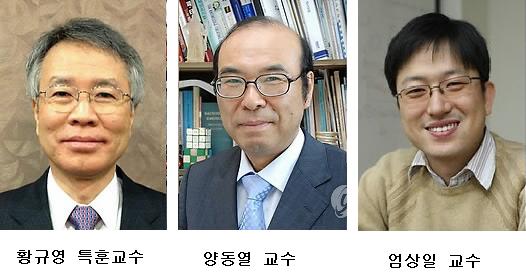 KAIST Professors win 2012 Korea Engineering Award
Distinguished Professor Hwang Gyu Young (Department of Computer Science) and Professor Yang Dong Yol (Department of Mechanical Engineering) from KAIST received the 2012 ‘Korea Engineering Award’ hosted by the Ministry of Education, Science and Technology and the Korea Research Foundation.
The ‘Korea Engineering Award’ is given biennially to researchers who have accomplished world class research and have contributed greatly to Korea’s development in the field of Science and Technology. The award started in 1994 and a total of 24 recipients were recognized in various fields such as electronics, mechanics, chemistry, construction, etc. The recipients of the award areawarded the Presidential award as well as 50million won as prize money.
Professor Hwang was recognized for his research on DBMS close-coupling architecture as well as other new data base system theories, contributing to the development of the IT software industry in Korea. Professor Yang was praised for his work in precision shape creation and manufacturing, especially for his work in the nano-stereolithography process.
In addition, Professor Oum Sang-il from the Deparment of Mathematical Science received the 2012 ‘Young Scientist Award’ hosted by the Ministry of Education, Science and Technology and the Korean Academy of Science and Technology.
The ceremony for ‘Korea Engineering Award’ and the ‘Young Scientist Award’ was held in Seoul Press Center Press Club on the 21st of December.
2012.12.26 View 13321
KAIST Professors win 2012 Korea Engineering Award
Distinguished Professor Hwang Gyu Young (Department of Computer Science) and Professor Yang Dong Yol (Department of Mechanical Engineering) from KAIST received the 2012 ‘Korea Engineering Award’ hosted by the Ministry of Education, Science and Technology and the Korea Research Foundation.
The ‘Korea Engineering Award’ is given biennially to researchers who have accomplished world class research and have contributed greatly to Korea’s development in the field of Science and Technology. The award started in 1994 and a total of 24 recipients were recognized in various fields such as electronics, mechanics, chemistry, construction, etc. The recipients of the award areawarded the Presidential award as well as 50million won as prize money.
Professor Hwang was recognized for his research on DBMS close-coupling architecture as well as other new data base system theories, contributing to the development of the IT software industry in Korea. Professor Yang was praised for his work in precision shape creation and manufacturing, especially for his work in the nano-stereolithography process.
In addition, Professor Oum Sang-il from the Deparment of Mathematical Science received the 2012 ‘Young Scientist Award’ hosted by the Ministry of Education, Science and Technology and the Korean Academy of Science and Technology.
The ceremony for ‘Korea Engineering Award’ and the ‘Young Scientist Award’ was held in Seoul Press Center Press Club on the 21st of December.
2012.12.26 View 13321 -
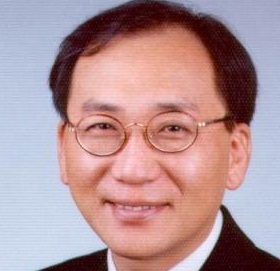 Professor Cho Young-ho wins 'E2 Star' award
Professor Cho Young-ho from the Department of Bio and Brain Engineering at KAIST was chosen as the ‘E2 Star’ at the ‘2012 Engineering Education Festa’ in academics. The ‘2012 Engineering Education Festa’ hosted by the Ministry of Education, Science and Technology was held to display outstanding research results and to conceptualize the future of science education.
The ‘E2 star’ award is given to renowned figures in industry, academia and society. A total of 35 candidates were recommended for the 3 fields and Professor Cho received the first place in the online voting.
Professor Cho received high marks for his work in engineering education, research development and increasing the communication between academia and industry, as well as the commercialization of science and technology. Professor Cho was especially praised for the specialization of engineering education in integrated fields and the joint research with US and Swiss universities.
Professor Cho Young-ho(Department of Bio and Brain Engineering, KAIST)
2012.12.26 View 10717
Professor Cho Young-ho wins 'E2 Star' award
Professor Cho Young-ho from the Department of Bio and Brain Engineering at KAIST was chosen as the ‘E2 Star’ at the ‘2012 Engineering Education Festa’ in academics. The ‘2012 Engineering Education Festa’ hosted by the Ministry of Education, Science and Technology was held to display outstanding research results and to conceptualize the future of science education.
The ‘E2 star’ award is given to renowned figures in industry, academia and society. A total of 35 candidates were recommended for the 3 fields and Professor Cho received the first place in the online voting.
Professor Cho received high marks for his work in engineering education, research development and increasing the communication between academia and industry, as well as the commercialization of science and technology. Professor Cho was especially praised for the specialization of engineering education in integrated fields and the joint research with US and Swiss universities.
Professor Cho Young-ho(Department of Bio and Brain Engineering, KAIST)
2012.12.26 View 10717 -
 Midam Scholarship Society Receives Minister of Education, Science, and Technology Prize for Education Donation
Midam Scholarship Society, consisting of KAIST students, has been awarded the First Korea Education Donation Grand Prize from the Ministry of Education, Science and Technology.
The Education Donation Prize has been created in order to encourage those university clubs that have been increasing awareness of education donation and at the same time donating educational services themselves.
Midam Scholarship Society was established by KAIST students in 2009 to provide educational services to those students from low income families. Currently over 200 students from six different universities (KAIST, UNIST, Pusan University, Chonnam University, Kyungpook National University, Kumoh Engineering University) are involved in the Midam Scholarship Society.
Approximately 70 students participate in the KAIST Midam Scholarship Society. The classes take place in the classrooms every week for three hours over a period of three months. The classes are offered to over 1,000 high school students in and near DaeJeon.
2012.12.21 View 9745
Midam Scholarship Society Receives Minister of Education, Science, and Technology Prize for Education Donation
Midam Scholarship Society, consisting of KAIST students, has been awarded the First Korea Education Donation Grand Prize from the Ministry of Education, Science and Technology.
The Education Donation Prize has been created in order to encourage those university clubs that have been increasing awareness of education donation and at the same time donating educational services themselves.
Midam Scholarship Society was established by KAIST students in 2009 to provide educational services to those students from low income families. Currently over 200 students from six different universities (KAIST, UNIST, Pusan University, Chonnam University, Kyungpook National University, Kumoh Engineering University) are involved in the Midam Scholarship Society.
Approximately 70 students participate in the KAIST Midam Scholarship Society. The classes take place in the classrooms every week for three hours over a period of three months. The classes are offered to over 1,000 high school students in and near DaeJeon.
2012.12.21 View 9745 -
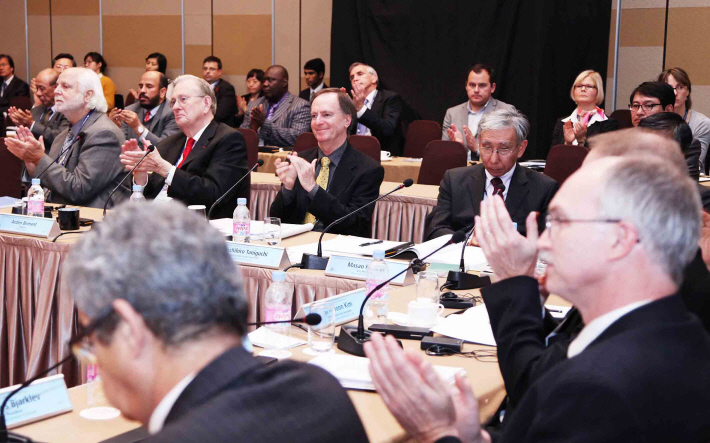 Education 3.0: a change from teaching to learning
On October 16th, educationalists and Presidents from research-oriented universities around the world gathered in Seoul to attend the 2012 International Presidential Forum on Global Research Universities, where KAIST introduced its new smart learning model ‘Education 3.0’.
Smart learning ‘Education 3.0’ allows students to learn from lectures given by renowned scholars through the internet and encouraged student to professor discussion. This technology was created to deal with the ever-changing classroom dynamics due to the advancement of IT technology.‘Education 3.0’ differs from the traditional teaching-based lectures in that it offers a platform for self-directed learning. KAIST is working to spread ‘Education 3.0’ by providing specialized classrooms and running an online learning platform that complements it.
This spring, KAIST adopted ‘Education 3.0’ in 3 courses and received high praise from students (a rating of 4.4 out of 5.0). Hence, the number of courses was extended to 10 this fall.
Through this gathering, KAIST hopes to develop cooperative connections between foreign universities to share learning platforms and contents. On October 16th, KAIST signed a MOU with Denmark’s Danmarks Tekniske Universitet (DTU) to provide a cyber-dual degree program using ‘Education 3.0’. Hence, students studying Web science and Digital Media in either KAIST or DTU can receive degrees from both schools without physically visiting them.
President Suh said that “‘Education 3.0’ provides a new paradigm of learning which moves from the tradition cramming method of teaching to self-directed learning” and that this model will help the globalization of KAIST by initiating global cooperation with foreign universities.
Over 60 Universities from 27 different countries attended the forum, including ULCA and Caltech from the United States, DTU from Denmark, University of Southampton and University of York from England, University of Queensland from Australia, Nanyang Technological University from Singapore and Tokyo Institute of Technology from Japan. Members from Korean Universities such as Hanyang University, Handong Global University, Sogang University and Sookmyung Women"s University also attended.
2012.10.25 View 10782
Education 3.0: a change from teaching to learning
On October 16th, educationalists and Presidents from research-oriented universities around the world gathered in Seoul to attend the 2012 International Presidential Forum on Global Research Universities, where KAIST introduced its new smart learning model ‘Education 3.0’.
Smart learning ‘Education 3.0’ allows students to learn from lectures given by renowned scholars through the internet and encouraged student to professor discussion. This technology was created to deal with the ever-changing classroom dynamics due to the advancement of IT technology.‘Education 3.0’ differs from the traditional teaching-based lectures in that it offers a platform for self-directed learning. KAIST is working to spread ‘Education 3.0’ by providing specialized classrooms and running an online learning platform that complements it.
This spring, KAIST adopted ‘Education 3.0’ in 3 courses and received high praise from students (a rating of 4.4 out of 5.0). Hence, the number of courses was extended to 10 this fall.
Through this gathering, KAIST hopes to develop cooperative connections between foreign universities to share learning platforms and contents. On October 16th, KAIST signed a MOU with Denmark’s Danmarks Tekniske Universitet (DTU) to provide a cyber-dual degree program using ‘Education 3.0’. Hence, students studying Web science and Digital Media in either KAIST or DTU can receive degrees from both schools without physically visiting them.
President Suh said that “‘Education 3.0’ provides a new paradigm of learning which moves from the tradition cramming method of teaching to self-directed learning” and that this model will help the globalization of KAIST by initiating global cooperation with foreign universities.
Over 60 Universities from 27 different countries attended the forum, including ULCA and Caltech from the United States, DTU from Denmark, University of Southampton and University of York from England, University of Queensland from Australia, Nanyang Technological University from Singapore and Tokyo Institute of Technology from Japan. Members from Korean Universities such as Hanyang University, Handong Global University, Sogang University and Sookmyung Women"s University also attended.
2012.10.25 View 10782